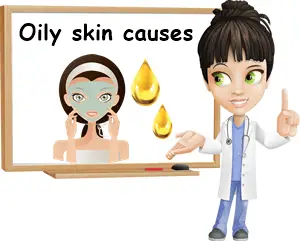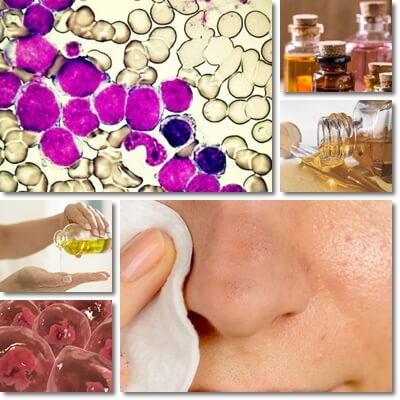Oily skin is one of four major skin types, along with dry skin, combination skin and normal skin. It is characterized by the production of more sebum by the sebaceous glands in the skin, compared to other skin types. This causes the skin to have a shiny appearance and an oily feel. However, it’s not until the sebum production is excessive that oily skin becomes bad for you. Excess sebum means more food for bacteria and other microorganisms living on the surface of the skin and consequently acne, sensitization and related skin problems. And while you can’t treat or reverse oily skin, you can reduce sebum production for a less oily skin and other benefits.
Is it good or bad to have oily skin? It’s actually good to have oily skin. The reason for this is that sebum is actually protective of the skin and can delay aging by maintaining skin healthy, moisturized as well as providing photoprotective and antioxidant benefits. Studies suggest sebum actually carries vitamin E to the surface of the skin and it is this vitamin E that accounts for the delayed aging seen in oily skin types. Every time your skin becomes greasy, you are actually enjoying a protective fats and vitamin E face mask that prevents your skin from losing moisture and keeps you looking young longer.

How to test if you have oily skin or another skin type. Wash your face as you normally do, then just let it be. If it becomes shiny and gets covered by a thin greasy film all over within one hour or so, then you have oily skin. If only the forehead, nose and chin become oily and shiny, while the rest of the face is normal or dry, then you have combination skin. If you feel your skin stretchy, uncomfortable or it becomes flaky, then it’s dry skin. If it’s neither dry or oily, but a good in-between, then it’s normal skin.
Another way you can tell if you have oily skin is based on the characteristics of this skin type.
Oily skin characteristics and symptoms
1) Large, visible pores especially on the nose and around it. Smaller, but still visible pores on the lower part of the forehead, above the eyebrows and sometimes on the chin.
2) Clogged pores, blackheads, whiteheads.
3) Acne breakouts, more common when there are also hormone fluctuations.
4) Make up runs down your face or looks like it’s been absorbed by the skin. It’s especially visible with foundation and eyeshadow.
5) If you have a fringe, you probably need to wash it every day or every other day because it gets greasy.
6) Shiny, oily looking skin when you wake up in the morning and at the end of the day.
7) Acne, especially cystic acne, frequent breakouts, blemishes, irritation. Sometimes, oily skin with rosacea can occur.
8) Skin appears thick and may look dull, despite the shine from sebum.
9) Skin feels dirty easily and pores clog rapidly, especially in areas of air pollution, where there is dust or if you sweat.
Oily skin with dry, flaky patches on the cheeks or chin is actually combination skin.

What causes excessively oily skin?
Like I mentioned above, oily skin is a normal skin type and it only becomes problematic when the sebum production is excessive, to the point you can’t manage it. Oily skin causes include:
1) Hereditary causes. It’s likely we inherit our type of skin from our parents just as we inherit so many of the characteristics that make us who we are.
2) Hormone fluctuations. Whether they are genetically predetermined, naturally occurring or acquired over time, hormonal imbalances account for the bulk of oily skin types. Hormonal imbalances can be genetically predetermined from diseases or conditions we may inherit from our parents, especially those relating to the immune and endocrine system. They can occur naturally as we age and go through various developmental stages.
One such example is going through adolescence. During this time, sebaceous glands become mature and more hormones are produced, resulting in oily skin and acne. Pregnancy also causes hormonal imbalances which can lead to oily skin and acne. There is actually a condition known as pregnancy acne with its continuation, post-pregnancy acne.
3) Disease. Seborrhea is a condition that causes overactive sebaceous glands, oily skin and greasy hair. Polycystic ovary syndrome (PCOS), tumors and all sorts of medical conditions affecting the endocrine system can cause excessively oily skin.
4) Incorrect skincare regimen. Many people struggle with taking care of their oily skin because they wrongfully assume that if you have oily skin, you don’t need to moisturize it. When, in fact, moisturizing is an essential step in getting rid of excessively oily skin. You just have to use gentle face washes, lightweight creams and moisturizing products and water-based serums for both a optimal level of hydration and to have less oily skin.
5) Stress and environmental factors. A lot of people ask themselves ‘Why do I have oily skin if I have a correct skincare routine?’. Believe it or not, stress puts the endocrine system into overdrive and it is the endocrine system which determines hormone production. So if you’re stress a lot all the time, chances are your skin will be greasy despite taking good care of it. At the same time, stress occurs along with tiredness and lack of time. These concurrent factors produce can cause some people to forgo their skincare regimen and, without proper care, skin can become greasier. Air pollution, use of cheap skin care products and make up can further accentuate oily skin shine.
6) Diet and nutrition. For the most part, oily skin is genetic and caused by hormonal imbalances so you can’t stop oily skin with diet. At the same time, eating a lot of greasy foods, especially the processed kind can cause oilier skin and acne. A higher ratio of animal products compared to plant products can have the same effects for some people. Lastly, nutrient deficiencies can exacerbate certain conditions that could lead to greasy skin such as seborrhea.
Oily skin treatment options
A good skincare regimen that accounts for the requirements of your particular skin type is the best solution if you want to have less oily skin. However, it is important to understand there is no permanent cure for oily skin. Of course, your skin type may change with time and go from oily to mixed to dry, but this is caused by factors over which we generally have little control. Similarly, skin requires constant care so even if you have taken really good care of your skin for years, not caring for it with the same attention any more can cause it to become excessively oily.
The best tips for oily skin to help reduce excess sebum
1) Clean your face 3 times a day or at least in the morning when you wake up and in the evening before you go to sleep. For the rest of the skin, one shower a day is enough, unless you have been exercising or sweating from other causes, in which case washing is imperative to reduce sebum buildup.
2) Always use gentle face washing products, preferably gel-based or foamy. Avoid harsh cleaning products that leave your face feeling dry and stretchy.
3) Look for natural products with natural ingredients such as aloe vera gel, honey, chamomile, sea buckthorn oil or other herbal ingredients.
4) Use lightweight moisturizers, suited for your skin type. Avoid heavy moisturizing creams that clog the pores.
5) Use water-based cleansers, creams and serums. They maintain an optimal level of hydration without clogging pores with oils.
6) When your skin is feeling excessively oily, use water-based serums with collagen, hyaluronic acid and vitamins A and C to restore hydration and avoid greasy skin. Use it after cleaning the face, 2-3 times a day.
7) Exfoliate to unclog pores, but make sure you hydrate the skin afterwards or else it can become excessively greasy. Sugar is a great, cost-effective option for exfoliating oily skin.
8) Never sleep with make up on. Always clean the face with water and a face cleanser, not just wipes. Removing make up and any impurities that may have accumulated on top of it during the day helps keep pores from clogging.
9) Avoid harsh, drying face masks. The goal is to gently remove excess sebum without harming the skin or altering its natural balance. Home made face masks with honey, cucumber, yogurt, milk or apple are great. Extra-hydrating store-bought face masks are the best.
10) Avoid picking acne and blackheads. If you clean your face well 2-3 times a day and apply a lightweight or water-based hydrating product, it will dry out and heal a lot faster. Exfoliate 2-3 times a week to clean your pores.
11) Drink plenty of water, avoid touching your face, clean you makeup brushes, use makeup for your skin type and wash your hair 2-3 times a week or as often as needed to avoid clogged pores and acne from the dirt that collects in the hair.
12) Oily skin care in winter requires less exfoliation and good hydration with lightweight creams and water-based serums with collagen, hyaluronic acid and vitamins A and C. Remember that oily and combination skin are just as sensitive in winter as dry skin.
